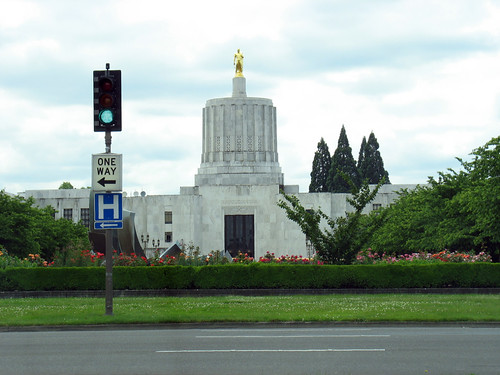Photo of Oregon State Capital, photo by Andreas Pagel licensed under Creative Commons
The American Council on Education has analyzed that Southern Oregon is expected to receive over $3,000,000 after Congress passed the “largest federal emergency package in history,” according to the Higher Education Coordinating Commission’s latest legislative update.
The Coronavirus Aid, Relief, and Economic Security Act includes a nationwide $2 trillion in relief. The CARES Act relief was divided amongst the respective categories from most to least: Individuals, Corporations, Small Business, State and Local Governments, Public Health, Education, and a Safety Net. This image from NPR visualizes the allocations:
Education is the second to last on this list, with $30.75 billion allocated to the “Education Stabilization Fund.” However, at least half of each university’s allotment funds are required to be used for emergency student aid.
Congress may pass the fourth revision to these funds and their allocations, as requested by House Speaker Nancy Pelosi. Currently everything is speculative.
Greg Perkinson, the Vice President for Finance and Administration at SOU, provided a helpful source from the Higher Education Coordinating Commission (HECC). It is a useful link that breakdowns these fund allocations and their purposes.
The current Preliminary Analysis estimated SOU’s stimulus distribution to be a total of $3,682,000. Below is a quote from HECC’s April Legislative update on the Education Stabilization Fund:
“$30.75B in funding for education. Of the total, 2% of funding is reserved for Indian Education, grants to governors, and administrative expenses. 46.3% of the remainder is reserved for higher education. Of the amount directly received by institutions ($12.56B), 90% is allocated based 75% on Pell FTE and 25% based on non-Pell FTE. 7.5% of the remainder is reserved for minority serving institutions and the Strengthening-Institutions Program (SIP), and the remaining 2.5% is reserved for the Fund for the Improvement of Postsecondary Education (FIPSE) program.”
A quarter of the 90% received by institutions is intended for non-Pell Full-Time Equivalent students. However, NPR reported that all federal loan payments can be deferred until September 2020. Also, any students who had to withdraw because of COVID-19 will have their outstanding federal debt canceled.
According to the Federal Student Aid Office, some institutions may use the Supplementary Educational Opportunity Grant (SEOG) provided to them. These are limited funds that are provided to distribute accordingly. The U.S. Department of Education is also allowing the conversion of untapped Federal Work-Study funds into SEOGs.
Greg Perkinson stated that SOU is planning to roll out some temporary, socially distanced maintenance jobs. Greg stated that, “[SOU facilities] is looking to hire a crew of students that might help [SOU’s facilities] craftsmen with small projects like painting projects or cleaning projects, where we can do work safely, keeping appropriate physical separation or social distance…Bringing people in a way that supports our institution, keeps them safe, but also gives them a source of revenue.”
Olivia Bozarth, Vice President of ASSOU, gave her perspective as a student representative during this time. She stated that “I wish it was easier for faculty, but it’s been tough. They had to roll out a fully new system for students. They had like two weeks, finishing up all their finals, getting grades out and planning an entirely new course digitally.” She also discussed how certain majors might have to adjust to this shift, such as her education focus, which requires interactivity and class discussions. Olivia mentioned that ASSOU is currently working on how to hold their annual election online.
There will be more information to come as the following days unfold. Below is the HECC’s statement on the results of the pandemic on Oregon’s 2021 Legislative Session:
“Prior to the emergency, HECC was beginning a process of engagement through two Governor’s office-led work groups, one on affordability and vulnerable populations, and another on equity. These cross agency collaboration workgroups were beginning to develop proposals to bring to the Governor as part of her 2021-2023 budget consideration. Those processes have been suspended, and future engagement is unclear in light of the rapidly changing economic climate.”
For more information about SOU’s response to COVID-19, click here.



